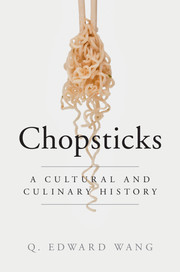Book contents
- Frontmatter
- Dedication
- Contents
- Acknowledgments
- List of Plates
- Timeline
- Map of East Asia
- 1 Introduction
- 2 Why chopsticks? Their origin and original function
- 3 Dish, rice or noodle? The changing use of chopsticks
- 4 Forming a chopsticks cultural sphere: Vietnam, Japan, Korea and beyond
- 5 Using chopsticks: customs, manners and etiquette
- 6 A pair inseparable: chopsticks as gift, metaphor and symbol
- 7 “Bridging” food cultures in the world
- Conclusion
- Glossary
- Bibliography
- Index
- Plate section
- References
6 - A pair inseparable: chopsticks as gift, metaphor and symbol
Published online by Cambridge University Press: 05 February 2015
- Frontmatter
- Dedication
- Contents
- Acknowledgments
- List of Plates
- Timeline
- Map of East Asia
- 1 Introduction
- 2 Why chopsticks? Their origin and original function
- 3 Dish, rice or noodle? The changing use of chopsticks
- 4 Forming a chopsticks cultural sphere: Vietnam, Japan, Korea and beyond
- 5 Using chopsticks: customs, manners and etiquette
- 6 A pair inseparable: chopsticks as gift, metaphor and symbol
- 7 “Bridging” food cultures in the world
- Conclusion
- Glossary
- Bibliography
- Index
- Plate section
- References
Summary
The joy of eating is given great importance in China; and cooking, through the decades, has been dreamed and fussed over, in times of want as well as in times of plenty, until it has ceased to be plain cooking, but has grown and developed into an art. Food has been represented through other mediums of art, especially poetry, literature and folklore; and these tales and food beliefs have been handed down, from generation to generation, with ever-increasing glamour.
Doreen Yen Hung Feng, The Joy of Chinese CookingGreen when young and yellow old
They have shared their minds forever.
Whether bitter or sweet,
They always taste them together.
Zhuo Wenjun, a woman who lived in Han dynasty China, allegedly wrote this poem to her lover Sima Xiangru (179–127 bce), when she gave him a pair of chopsticks. In his legendary work, Sima Qian records some details about their love story, making it proverbial throughout Chinese history. Sima Xiangru was an illustrious writer, known for his mastery of rhapsody (fu), a prevalent literary genre during the period. (Shu Xi, for instance, wrote a rhapsody on doughy food in the third century, as mentioned in Chapter 3.) As Sima Xiangru’s fame grew, he also received several marriage proposals. On one occasion, Zhuo Wangsun, the richest man in the country, invited Sima to a banquet. Sima went reluctantly. At the party, he chanted a rhapsody, receiving many accolades. Attracted by Sima’s talent, Zhuo Wenjun, Zhuo Wangsun’s newly widowed daughter, fell in love with him. But her father disapproved of it because Sima Xiangru was poor. However, the two managed to elope to Chengdu, Sichuan, eventually forcing the father to give in and accept their marriage.
- Type
- Chapter
- Information
- ChopsticksA Cultural and Culinary History, pp. 120 - 143Publisher: Cambridge University PressPrint publication year: 2015



